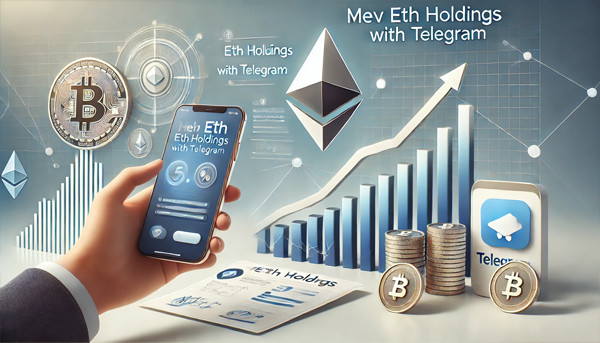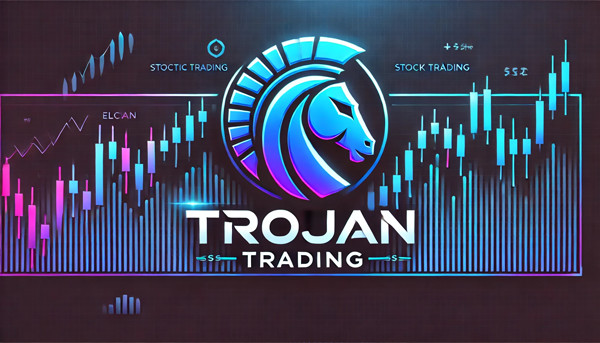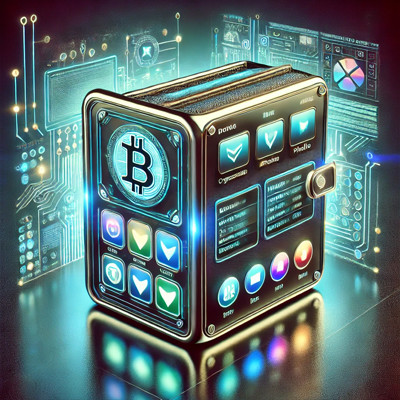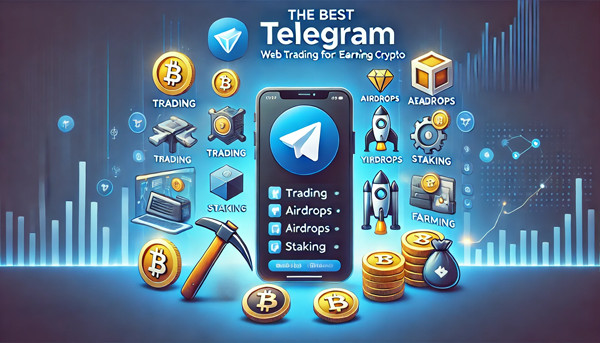The Decentralized Cryptocurrency Market: Powerful Trading Tools
The cryptocurrency market has evolved into a powerhouse of decentralized finance (DeFi), offering a wealth of innovative tools and platforms that are transforming how traders engage with digital assets. Traditionally, traders have relied on centralized exchanges (CEXs), where control over their funds was often limited. Centralized platforms required users to surrender custody of their assets, placing them in the hands of a third party and exposing traders to risks such as hacks, exchange shutdowns, or even asset freezes. With the rise of DeFi, however, a new landscape has emerged—one where self-custody is the norm and control is returned to the individual. This shift has empowered traders, providing greater security, autonomy, and financial freedom.
DeFi apps, particularly those integrated into messaging platforms like Telegram, have further democratized access to decentralized trading tools. Telegram trading platforms, such as Trojan and Maestro, give users the ability to manage their trades, automate strategies, and monitor portfolios—all from the convenience of a messaging app. These bots integrate seamlessly with decentralized exchanges, offering features like liquidity pool (LP) sniping, auto-buy/sell, and copy trading. These powerful tools allow both novice and experienced traders to execute advanced strategies with ease, making DeFi more accessible and enhancing the capabilities of the average trader. By leveraging these decentralized tools, traders can make faster, more informed decisions without needing to rely on cumbersome and often restrictive centralized platforms.
At the core of the DeFi ecosystem are decentralized exchanges (DEXs), which offer a range of advantages over their centralized counterparts. On a DEX, users retain full control of their funds, executing trades directly from their wallets via blockchain smart contracts. This not only enhances security but also provides greater transparency and autonomy. Additionally, DEXs eliminate the need for intermediaries, enabling users to trade peer-to-peer without undergoing complex KYC processes. This permissionless access opens up a world of opportunities for traders across the globe, providing access to new and emerging tokens that may not yet be listed on centralized exchanges. Whether you’re a seasoned trader or new to the crypto space, DEXs offer an efficient, secure, and inclusive way to engage in the cryptocurrency market. In this blog, we’ll dive deeper into these benefits, guiding you through the steps to get started in the world of decentralized trading.
The Benefits of Self-Custody in the Cryptocurrency Market
In the world of traditional finance, intermediaries hold the keys to your assets, but the decentralized cryptocurrency market flips that script. Self-custody gives traders complete control over their funds. When you own your private keys, you truly own your assets — no third party can freeze, block, or seize them.
This level of autonomy is a game-changer for security and privacy. By keeping your funds in your personal wallet, you avoid the risk of exchange hacks or frozen accounts that centralized exchanges are vulnerable to. With self-custody, you are in full control of your assets at all times.
Here’s why self-custody is a must for serious traders:
- True Ownership: Your funds are in your hands, no middlemen involved.
- Enhanced Security: Avoid risks associated with centralized platforms, such as exchange hacks.
- Privacy and Freedom: No need to share personal information or submit to Know Your Customer (KYC) protocols.
In a decentralized market, self-custody is the foundation for building a more secure and free trading experience.
DeFi Apps and Telegram Trading Platforms: Empowering the Average Trader
DeFi apps have leveled the playing field, offering traders of all experience levels access to powerful trading tools. One of the most impactful developments is the rise of Telegram trading platforms. These bots allow you to trade directly from your chat app, giving you an easy, fast, and convenient way to access decentralized markets.
For the average trader, these bots remove many of the barriers that previously existed in DeFi trading. Features like auto-buy/sell, sniping tools, and limit orders are built right into these platforms, helping you execute trades with speed and precision. There’s no need to sit at your computer analyzing charts for hours. These platforms put the power of DeFi in your hands and simplify the trading process with user-friendly interfaces.
Here’s how Telegram trading platforms are advancing traders’ capabilities:
- Automation: Set automated trades like buy/sell orders or copy trades of successful traders.
- Speed: Execute trades instantly, often faster than manual trading on traditional exchanges.
- User-Friendly: Trade directly from Telegram without the need to interact with complex decentralized exchanges manually.
Telegram trading platforms are an incredible tool for traders looking to optimize their strategies and save time while still making informed decisions.
Telegram trade bots like Trojan and Maestro are innovative tools that allow users to trade cryptocurrencies directly from within the Telegram messaging app. These bots are part of the decentralized finance (DeFi) ecosystem, helping traders execute trades quickly, monitor their portfolios, and leverage advanced trading features—all without leaving the convenience of their Telegram chats.
Trojan Telegram Trade Bot
Trojan is a versatile trade bot that integrates directly with decentralized exchanges (DEXs), on the Solana blockchain. It is designed to help traders take advantage of Solana’s lightning-fast transaction speeds and low fees. With Trojan, users can access powerful tools such as:
- LP Sniping: Allowing traders to jump into liquidity pools at the very moment they go live, giving them an edge in acquiring tokens at the lowest possible prices.
- Limit Orders: A feature where users can set specific prices to buy or sell tokens, ensuring they get the desired price automatically when the market reaches their target.
- Rapid Buy/Sell: Facilitates quick execution of trades, ideal for users who need to move fast to capture opportunities.
- Copy Trading: This feature lets users mimic the trades of successful traders, allowing them to benefit from expert strategies.
- Bridge and Token Transfers: It enables cross-chain transfers, allowing traders to move assets between blockchains quickly and securely.
- Addtional Features: Packed with tons more features includiin Token Scanner, Multi-Wallet, DCA Mode, Bubblemaps…
Trojan combines these advanced features with an intuitive interface that works seamlessly within Telegram, making it easy for users to manage their trades without needing to log into a separate DEX interface.
Maestro Telegram Trade Bot
Maestro, similar to Trojan, is another Telegram-based bot offering sophisticated trading capabilities but has the ability to Trade on Multiple Blockchains including Ethereum, Solana, Tron, Base, BSC, TON, ARB and More.
- Sniping Tools: With Maestro, users can execute buy orders as soon as a new token becomes available on DEXs, giving them an advantage in securing tokens before prices rise.
- Auto-Buy/Sell: This feature enables traders to set automatic buy or sell orders based on pre-defined conditions, such as price thresholds or time triggers.
- DCA (Dollar-Cost Averaging): Allows users to spread out their purchases of a token over time, reducing the impact of price volatility and lowering the average cost of acquisition.
- Gas Management: Maestro helps users optimize gas fees, particularly important on the Ethereum network, where transaction costs can fluctuate significantly.
- Portfolio Tracking: In-app portfolio monitoring allows users to keep an eye on their holdings and profits without leaving Telegram.
- Addition Features: Maestro is packed with additional features and ever expanding.
Both Trojan and Maestro empower traders by automating key aspects of their trading strategy. Whether you’re looking to snipe new token launches, automate repetitive trades, or copy successful traders’ strategies, these Telegram bots offer a convenient and effective solution to enhance your DeFi trading game.
More Trade Bots
- SHURIKEN : Sol Eth Base Avax Arb Bsc Ftm TRON SUI Runes READ MORE
- SIGMA : Eth Base Bsc Degen Blast Bsc Avax Ftm +
- BULLX: Hybrid DEX Telegram BOT ETH SOL BASE BSC ARB BLAST
- REKT BOT : SOLANA READ MORE
- MEVX : Hybrid DEX SOL ETH BSC
- SUISNIPERBOT : SUI
- BAZOOKA BOT : SOL ETH BASE ARB OP BSC
- TON TRADING BOT : Ton

The Advantages of Using a DEX
Decentralized Exchanges (DEXs) are at the heart of the DeFi revolution, transforming how traders interact with cryptocurrencies. Unlike centralized exchanges (CEXs) that act as intermediaries, DEXs facilitate peer-to-peer (P2P) trading directly from a user’s wallet, leveraging blockchain technology to enhance transparency, security, and autonomy. As more traders seek alternatives to centralized platforms, DEXs have become essential for navigating the cryptocurrency market. Let’s explore the key advantages of using a DEX.
1. True Ownership and Self-Custody
One of the most significant benefits of using a DEX is self-custody. On centralized exchanges, users must deposit funds into the exchange’s wallet, relinquishing control of their assets. In contrast, DEX users maintain full control over their funds throughout the entire trading process. Trades are executed directly from the user’s wallet via smart contracts, which means:
- You hold your private keys: This ensures you remain in complete control of your assets, mitigating risks such as hacks or exchange shutdowns.
- No third-party control: Since DEXs don’t take custody of your funds, there’s no risk of your assets being frozen or withheld due to external factors, like regulatory changes or platform insolvency.
This approach empowers traders with full autonomy and greater security over their funds.
2. Increased Security and Transparency
DEXs operate on blockchain technology, which inherently enhances security and transparency. Centralized exchanges are vulnerable to attacks, with a history of hacks leading to significant losses for users. DEXs, by contrast, offer:
- Non-custodial security: With no central point of control, the risk of large-scale hacks is significantly reduced. Since assets remain in your wallet until the moment of trade, they are less exposed to centralized attacks.
- Smart contract transparency: All transactions on a DEX are processed by smart contracts that are publicly viewable and auditable. This transparency ensures that trades are executed fairly and according to predetermined rules.
- Decentralized governance: Many DEXs are governed by their communities, with decision-making power distributed among token holders, leading to a more democratized and transparent platform.
By utilizing blockchain-based smart contracts, DEXs minimize the risk of malicious interference and foster a more open trading environment.
3. Permissionless and Inclusive Access
One of the most attractive features of a DEX is its permissionless nature. Anyone with an internet connection and a compatible wallet can trade on a DEX, without needing to create an account or undergo KYC (Know Your Customer) procedures, which are mandatory on centralized platforms.
- No Account Needed: You can access a DEX without registering or providing personal information, protecting your privacy and reducing friction in accessing the market.
- Global Access: DEXs are accessible to anyone around the world, regardless of geographic location or government-imposed financial restrictions. This makes them especially valuable for users in countries with limited banking infrastructure or restricted access to traditional financial systems.
The permissionless framework promotes inclusivity and broadens participation in the global cryptocurrency market, empowering individuals in underserved regions.
4. Wide Variety of Token Listings
Centralized exchanges often have strict listing processes, meaning many emerging or smaller cryptocurrencies may not be available. On a DEX, any project can list its token as long as it adheres to the platform’s technical requirements. This creates a vastly larger pool of assets for traders to explore.
- Access to new and exotic tokens: DEXs provide opportunities to trade tokens that may not yet be listed on major centralized exchanges. This early access is crucial for traders looking to capitalize on early-stage projects.
- Innovative trading pairs: DEXs often offer a broader range of token pairs, allowing traders to directly swap between different cryptocurrencies without needing to convert to a base currency like BTC or ETH first.
For traders looking to diversify their portfolios or get in on the ground floor of new projects, DEXs offer unparalleled access.
5. Decentralized Liquidity and Yield Opportunities
DEXs also offer unique liquidity provision and yield farming opportunities. By participating in liquidity pools, users can earn rewards in the form of trading fees or additional tokens. This creates new earning potential for traders beyond simple buy-and-sell strategies.
- Liquidity Pools (LP): DEXs like Uniswap and SushiSwap allow users to contribute liquidity to various token pairs in exchange for a share of the trading fees. The more liquidity provided, the more stable and efficient trading becomes.
- Yield Farming: Many DEXs also offer yield farming programs, where users can earn rewards (often in the platform’s native token) by staking their assets in liquidity pools.
- Decentralized Finance (DeFi) Integrations: DEXs often integrate with broader DeFi ecosystems, offering features like lending, borrowing, and staking. This further expands the potential for earning passive income.
For users looking to generate passive income while supporting decentralized markets, DEXs present attractive opportunities for yield generation.
6. Lower Fees (Sometimes)
Although fees on DEXs can fluctuate depending on network congestion (especially on Ethereum), many decentralized exchanges offer lower fees compared to centralized platforms, particularly on chains like Binance Smart Chain (BSC), Solana, or Layer 2 solutions like Arbitrum and Optimism.
- Reduced reliance on intermediaries: With no need for third-party custody, there are fewer overhead costs, which can translate into lower trading fees for users.
- Optimized for low-cost networks: Many DEXs operate on blockchains with low transaction fees, making them an attractive option for traders looking to minimize costs.
However, it’s worth noting that on high-traffic networks like Ethereum, gas fees can occasionally spike, but with the rise of Layer 2 solutions, this is becoming less of a concern.
7. Censorship Resistance
Due to their decentralized nature, DEXs are much harder to shut down or censor than centralized exchanges. This makes them a resilient option for users looking to avoid regulatory oversight or those in regions where cryptocurrency trading might be restricted.
- Blockchain-based resilience: Since trades occur directly on the blockchain, and there’s no single point of failure or control, DEXs are far less susceptible to government censorship or external pressure.
This censorship resistance makes DEXs an attractive option for users who prioritize freedom and autonomy in their financial activities.
Getting Started with a DEX
If you’re new to using decentralized exchanges, here’s a quick guide on how to get started:
- Choose a Non-Custodial Wallet: To interact with a DEX, you’ll need a compatible wallet like MetaMask (for Ethereum and Layer 2s), Phantom (for Solana), or Trust Wallet (for multi-chain support). Make sure you keep your private keys safe.
- Connect Your Wallet to a DEX: Once your wallet is set up, navigate to a DEX like Uniswap, PancakeSwap, or SushiSwap, and connect your wallet.
- Start Trading: Select your trading pair and amount, confirm the transaction, and you’re done. Your trade will be processed by smart contracts on the blockchain.
- Explore Liquidity Provision: If you’re looking to earn passive income, consider providing liquidity to a pool. You’ll earn a portion of the transaction fees in return.
Top DEX
- JUPITER - SOLANA
- BULLX — ETH SOL BASE BLAST ARB BSC
- DBOT DEX — MULTICHAIN
- MEVX - Solana Ethereum Binance
- POND0X: Solana/Ethereum
- RAYDIUM - SOLANA
- KINE DEX : Multi Chain
- KWENTA DEX- MULTCHAIN
- 1DEX: Multi Cross Chain Swap
- ATOMIQ EXCHANGE — $SOL to $BTC DeFi Swap

Getting Started with Decentralized Trading
Ready to jump into the decentralized cryptocurrency market? Follow these steps to get started trading with self-custody, DeFi apps, and DEXs:
- Set Up a Wallet: The first step in decentralized trading is setting up a non-custodial wallet. Metamask is a popular option for Ethereum and Layer 2 solutions. For other networks, wallets like Phantom (Solana) or Trust Wallet (multi-chain) are excellent choices.
- Connect to a DEX: Once your wallet is set up, you’ll need to connect it to a decentralized exchange. Uniswap, SushiSwap, and PancakeSwap are some of the top DEXs for different blockchains. You can start by browsing these platforms for tokens you want to trade.
- Explore Telegram Trading Platforms: If you’re looking for automation or ease of use, explore Telegram trading bots like Unibot or MOONBOT. They allow you to execute trades directly from your messaging app and offer advanced tools like limit orders and auto trading.
- Make Your First Trade: With your wallet connected to a DEX or Telegram bot, you’re ready to start trading. Swap tokens, provide liquidity, or explore yield farming opportunities directly on decentralized platforms.

Conclusion: The Future is Decentralized
As the cryptocurrency market continues to evolve, decentralized exchanges (DEXs) are proving to be the future of trading. By empowering users with true ownership of their assets through self-custody, DEXs offer a level of security and control that centralized platforms simply cannot match. The transparency provided by blockchain technology and smart contracts ensures that every transaction is executed fairly and openly. Furthermore, the permissionless nature of DEXs allows anyone, anywhere in the world, to trade without the need for intermediaries or restrictive KYC processes. This global accessibility is key to fostering financial inclusion, giving users in underbanked regions the ability to participate in the cryptocurrency economy. For traders seeking greater autonomy, privacy, and security, DEXs are an invaluable tool in the rapidly expanding decentralized finance (DeFi) ecosystem.
Looking ahead, the future of cryptocurrency trading will increasingly be decentralized. The rise of Layer 2 solutions, cross-chain bridges, and improvements in blockchain scalability will make DEXs even more efficient, with lower fees and faster transaction times. The integration of decentralized financial tools, such as yield farming, liquidity provision, and staking, within DEX platforms is transforming them into comprehensive financial ecosystems. These advancements will continue to enhance the capabilities of average traders, offering a seamless and powerful alternative to traditional centralized platforms. As more users shift toward decentralized solutions, the crypto space will become more democratized, with DEXs leading the charge in shaping a new era of financial sovereignty and empowerment. The decentralized future is not just a vision—it’s already here, and it’s revolutionizing the way we trade and interact with digital assets.
Tags: automate trade, Crypto, cryptocurrencies, Defi, Dex, Telegram Bot, Trade bot






![[LIVE] Engage2Earn: $AUSPOL on the memecoin shill-dar](https://cdn.bulbapp.io/frontend/images/d8e380ef-23df-4ddc-8e19-28c3be2bece6/1)



![[ℕ𝕖𝕧𝕖𝕣] 𝕊𝕖𝕝𝕝 𝕐𝕠𝕦𝕣 𝔹𝕚𝕥𝕔𝕠𝕚𝕟 - And Now What.... Pray To The God Of Hopium?](https://cdn.bulbapp.io/frontend/images/79e7827b-c644-4853-b048-a9601a8a8da7/1)


